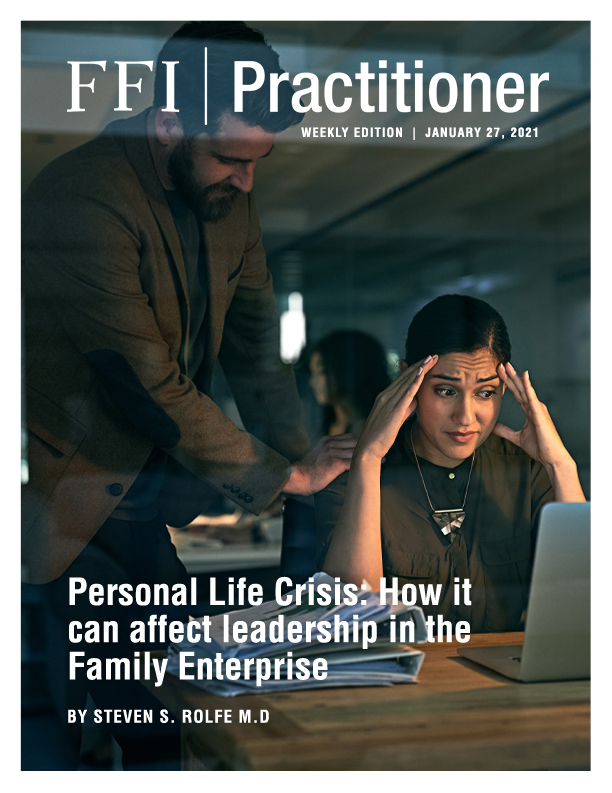
Two Examples
Two branches of a family-owned manufacturing company were at the point of break-up over whether future strategy should focus on improving efficiencies in current markets or expansion into new markets. The family conflict crystallized around a yearly prize. Should it go to a sponsor of a new business initiative, or to someone who improved current operations? The conflict intensified over several years, having a major impact on the prestige of the prize, the family, the business, and its reputation in the community.
The family business consultant was initially confused as to why this issue had generated so much discord in the family, considering all the other pressing needs of the business. As much as they tried, Uncle Bob and Uncle Ron, cousins who represented these feuding branches of this company could not make progress bringing the families together.
As a result of the family’s eventual recognition of the effect of Ryan’s behavior, tensions eased considerably, threatened lawsuits were avoided, and governance processes were put in place and used to effectively and meaningfully guide the firm’s future.
Another example of this dynamic occurred in a wholesale food business, where after founding and running the business for fifteen years, John Fluentes asked his much younger sister Andrea to leave her home country and join him in running the business. Several years after Andrea had joined him, John had a serious skiing accident, resulting in long-term physical and cognitive rehabilitation. Andrea was forced to step in and run the business while assisting significantly in John’s care. After three years, John resumed his previous position as CEO with majority shareholder rights, and Andrea was expected to resume her old duties as if nothing had transpired. Andrea was furious that no attention was paid to how she had saved the business in John’s absence and how the business had changed under her direction. It took many months of struggle with the two siblings, the board, and other shareholders to create an agreement and working relationship that was satisfactory to both Andrea and John. The consultation was complicated by the fact that although John was able to return to the company, his continued cognitive limitations were affecting business decisions in ways that only Andrea understood and that the board (consisting of family members who supported John’s return to leadership) was slow to appreciate.
Reflections on These Examples
These examples illustrate how the personal life crises of a family business leader figure critically in the future of the business. Strategic planning, governance, and business processes take a back seat to the immediacy of the leader’s life crisis and how the crisis will be managed, ignored, or denied by the leader and the stakeholders in the organization. Response to the crisis largely determines the future and well-being of the business and the family.
The popularity of shows like Billions and Succession point to a well-known truism: despite finely-crafted business plans, structures, and processes, many business decisions in the family enterprise are highly influenced by the personality and personal wishes of the founder and family leadership team. These in turn are often affected by personal life crises or trauma in a CEO, family, member or leadership team member.
Ideally, leaders will think carefully about how a personal life crisis impacts all aspects of their leadership, as well as their relationship with colleagues, clients, and family members. This includes the challenge of whether and how to disclose the nature of the life crisis to the family, ownership, and employees.
Though founders are often capable of managing organizational crisis, they may not be accustomed to facing their own vulnerability. Many leaders and entrepreneurs abhor asking for help. They are accustomed to being in charge, solving other’s problems. Most critically, they often deny the reality if not the impact, of a personal crisis or trauma.
Depending on the nature of the crisis as well as individual personality factors, they may bury themselves in work in an attempt to avoid or deny the significance of their condition. Founders may feel the crisis is no one else’s business; they may minimize the effect of the crisis on their performance. Difficulties may be manifest as withdrawal, preoccupation, anxiety, or overly controlling behavior. Decision making may appear impulsive and erratic. Frustration tolerance may be reduced and emotional outbursts more frequent.

At times the life crisis may relate more directly to family members working together in the business. Circumstances such as a divorce with spouses in the business, a parent having to deal with the psychological crisis of a child working in the business, or a succession plan affected by the illness of a child in the business present their own complex challenges.
In his work on “the succession conspiracy” Ivan Lansberg (1988) discusses how everyone in the family company plays a role, often unconscious, in how and why succession planning is avoided. Lansberg describes how each component of the family business organization contributes to a reluctance to plan for succession. He describes the anxiety that each stakeholder often experiences that contributes to the aversion to plan for the future.
Though sometimes a major life crisis may serve as a wake-up call for the founder and stakeholders to constructively plan for the future, frequently similar dynamics to those Lansberg describes are at play when illness or personal crisis strikes the leader.
When the CEO of the company controls the trusts of the second- and third-generation family members on the board, there can be an incentive to keep silent about any observed physical or mental change in the CEO, even if judgment, decision-making, or treatment of employees are affected.
A consulting impasse may be due to a failure to attend to the psychological dimensions of personal crisis and its effect on the leader and leadership team.
Conclusion
The consultant needs to have the ability to navigate the complexity of family dynamics, business needs, and goals, and needs to appreciate the effect of a personal crisis which may influence both systems. Consultants need to know when it is beyond their comfort or expertise to deal with the intensity of emotions and interpersonal conflict at play in these circumstances.
As consultants are better able to take into account the personal crises facing family enterprise leaders, they increase their chances of effectively addressing family leadership challenges, family dynamics, governance plans, and succession planning in the family enterprise.
Related References
Engel and Knock, ed., “When Life Strikes the President”, Oxford University Press, 2017
Hickman and Knouse, “When Leaders Face Personal Crisis”, Routledge, 2020
Human H.R. (2014, November 5) “Running a business while dealing with a personal loss” Entrepreneur. Retrieved from www.entrepreneur.com/article 239231
Jerrold M. Post MD and Robert S.Robins, When iIllness Strikes the Leader: The Dilemma of the Captive King, New Haven and London, Yale University Press, 1993
Kets de Vries, Manfred, Reflections on Character and Leadership, Jossey-Bass, 2009
Lansberg, “The Succession Conspiracy” Family business Review , 1988
Lansberg, I. “Family Firms That Survived Their Founders” Paper presented at the Annual Meeting of the Academy of Management, San Diego, Calif 1985
Levinson, H. “Conflicts That Plague the Family Business” Harvard Business Review, March-April 1971 pp 90-98

Steven S. Rolfe M.D., FFI Fellow, is the Managing Principal of Rolfe Advisory LLC. and is a physician, psychiatrist, and psychoanalyst who specializes in advising leaders and family enterprises who are confronting and deeply impacted by personal life crisis. He can be reached at srolfe@rolfeadvisory.com.


